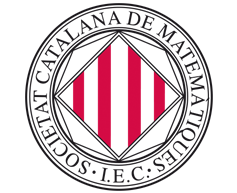Maria Bruna
University of Cambridge (UK)
“Diffusion of finite-size particles and application to heterogeneous domains”
In this talk, I will discuss nonlinear Fokker-Planck models describing diffusion processes with particle interactions. These models are motivated by the study of many-particle systems in biology and arise as the population-level description of a stochastic particle-based model. While mean-field approximations are valid for long-range interactions, here I will show how to tackle the case of short-range interactions such as finite-size or excluded-volume effects.
In the second part of the talk, I will discuss how this method can be used to derive an effective transport equation in heterogeneous domains, such as porous media or crowded environments. A nice feature of this approach is that it can easily account for macroscopic gradients in porosity or crowding. I will compare this with an alternative homogenisation method for periodic porous media and show an industrial application concerning filters.
Joaquim Serra
ETH Zürich (Switzerland)
“The singular set in the Stefan problem”
The Stefan problem, dating back to the XIX century, aims to describe the evolution of a solid-liquid interface, typically a block of ice melting in water. A celebrated work of Luis Caffarelli from the 1970’s established that the ice-water interface must be an analytic surface outside of a certain closed set: the so-called singular set. This singular set was only known to be contained in a surface of class $C^1 $ and it could be, a priori, as large as the regular set.
I will present a recent joint work with A. Figalli and X. Ros-Oton in which we obtain new delicate bounds on the size (Hausdorff dimension) of the singular set in the Stefan problem.
Susanna Terracini
Università di Torino (Italy)
“Chaotic behaviour and symbolic dynamics in Celestial Mechanics”
We consider the planar N-centre problem, with homogeneous potentials of negative degree, possibly anisotropic. We prove the existence of infinitely many collisions-free periodic solutions with negative and small energy, for any distribution of the centres inside a compact set. The proof is based upon topological, variational and geometric arguments. The existence result allows to characterize the associated dynamical system with a symbolic dynamics, where the symbols are the partitions of the N centres in two non-empty sets.
Karen Vogtmann
University of Warwick (UK) and Cornell University (USA)
“Spaces of graphs and tori”
The classical symmetric space SL(n,R)/SO(n) is often described as a space of marked lattices in R^n (marked by a choice of basis), but from another perspective it can be thought of as a space of flat n-dimensional tori, marked by a choice of basis for the fundamental group Z^n. In the 1980’s a space O_n, now called Outer space, was defined analogously as a space of marked metric graphs, marked by a choice of basis for the fundamental group F_n.
I will describe these spaces and explain some of the ways in which they can be used to give information about automorphisms of Z^n and F_n respectively. I will then show how to make a hybrid space which can be used to give information about automorphisms of groups that interpolate between F_n and Z^n, called `right-angled Artin groups`.
BMD EVENING TALK
Kevin Buzzard
Imperial College London (UK)
“The Future of Mathematics?”
I will talk about the state of the art of so-called “proof assistants”, computer systems which right now are pretty much incapable of assisting any mathematician with any serious proof.
However, these proof assistants can do something. In fact over the last few years the Lean proof assistant has been taught a lot of undergraduate and MSc algebra, analysis, number theory, geometry and topology. I will give a live demonstration showing what Lean can do now, and then talk about what proof assistants might soon be able to do, and speculate about how they might be useful to mathematicians in the future.
